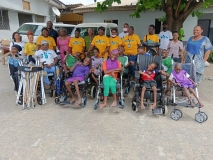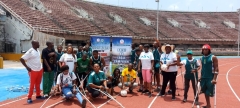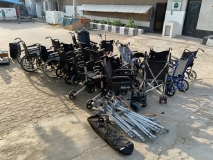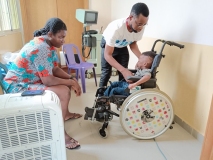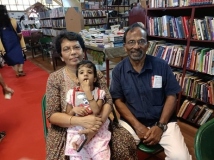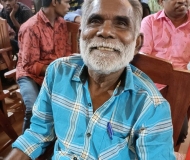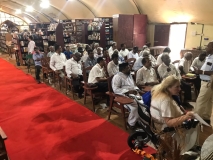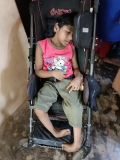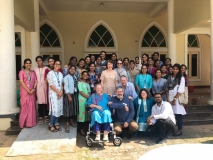New hope and new horizons: Summer 2024 Vital Link newsletter
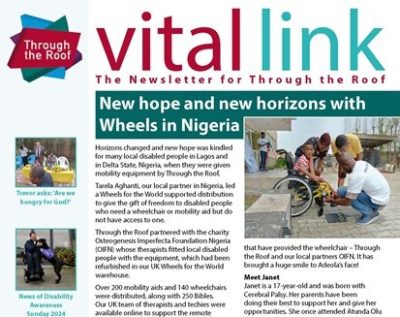
Welcome to the Summer 2024 Vital Link newsletter from Through the Roof.
Download your copy to:
- read all about lives transformed in Lagos and Delta State, Nigeria, as hundreds are blessed with wheelchairs and Bibles with our partner in mission OIF Nigeria
- hear about the exciting resources for Disability Awareness Week and how you can take part
- meet our latest Luke 5 Award winner, Madeleine Watts, a Parish Nurse in Stockport
- read the joyous story of Stephie, a former Wheels trip volunteer, who fell in love with Africa which led her to meet her future husband!
- find out how you can raise money for TTR through online shopping with Easyfundraising
- and much more...
-
-
-
-
-
-
- Follow this link to download the PDF of the Vital Link Summer 2024 newsletter
- Or contact us on 01372 749955 or email info@throughtheroof.org to request a different accessible format
- Or read Vital Link onscreen with the Joomag viewer below:
Open publication - Free publishing -
-
-
-
-
News release: Journey with Jesus for Disability Awareness Week 2024
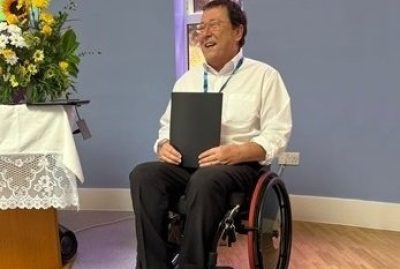
Disability charity Through the Roof is inviting churches to celebrate Disability Awareness Week. Everyone is encouraged to include local disabled people and to hold a service on Sunday 22nd September 2024, or a day of their choice. A free church resource pack is available here on the theme ‘Journey with Jesus’, featuring ‘Andrew’s story’ of his life-changing accident.
Plans for an action-packed Disability Awareness Week
Disability Awareness Week will begin on Sunday 15th September 2024 with a launch service which will be live-streamed on YouTube. The launch service will be led by Revd Helen Cameron, who will be President of the Methodist Conference. Helen is one of over 700 ‘Roofbreaker’ disability champions with Through the Roof, who listen to disabled people in local churches and work together with them to enable full inclusion. The charity hopes every church will nominate a Roofbreaker!
During September’s awareness week, churches are encouraged to find ways to meet with disabled people in their community. Suggestions are to hold a coffee morning with home-baked cakes and invite local disabled people. Or hold a social gathering, with craft activities or music that everyone can enjoy. Or come up with your own great ideas.
Why is disability inclusion in church important?
Churches often have outreach to youth but rarely think about disabled people and the Great Commission. But Jesus said they should be included in God’s great banquet: ‘Go out quickly into the streets and lanes of the town. Bring in those … who can’t see or walk ... compel them to come in so that my house will be full.’ (Luke 14:23, NIrV)
There are many barriers disabled people can face on their journey to join, or be fully included, in church fellowships. Accessibility of church buildings isn’t the only barrier for disabled people. There are lots of invisible barriers too, such as challenges fitting in socially and feeling you belong emotionally. That’s why we’re inviting churches on the ‘Journey with Jesus’ towards disability inclusion, to enable Access, Belonging and Commission of disabled people, to use their giftings in the Church.
Free resources available for Disability Awareness Sunday
The Disability Awareness Week resource pack shares more about the ABC Journey with Jesus. The pack includes a video story of Revd Andrew Miles, a retired pastor and wheelchair-user from Derby. God has called Andrew as a hospital chaplain, using the empathy and understanding gained from his accident and lived experience of disability. He says:
“I think because I'm in my wheelchair, people are a little bit more ready to listen. I hope that by my journey, my faith, they can see that God has brought me through one of the most challenging times... and He stayed with me. And here I am still ministering, still preaching the Word, seeing lives changed.”
Join us on the journey – Hold a Disability Awareness Sunday service or event in your church.
Order a free Disability Awareness Week 2024 resource pack, available at: https://throughtheroof.org/forchurches/disability-awareness-sunday/
Through the Roof’s mission is to transform lives through Jesus with disabled people. For more information, visit www.throughtheroof.org or @TTRChangesLives on social media.
Luke 5 Award for Parish Nurse Roofbreaker
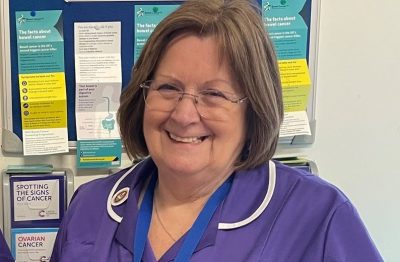
Through the Roof’s Luke 5 Award celebrates disability inclusion in Christian life. Usually, a disabled individual makes the nomination – to celebrate how an individual, group or church has made a difference by enabling them to access Christian life in some way. This time, we have several disabled people telling of how they are now able to access Christian life, thanks to Madeleine Watts: winner of a Luke 5 Award, as Parish Nurse and Roofbreaker at St Saviour’s Parish Church, Great Moor, Stockport.
“We have an amazing Gospel ... but is it accessible to all?”
Madeleine has encouraged the church to make great strides forwards for accessibility, including having large print available, reorganising pews for wheelchair users, and making sure a microphone is used in all meetings so that everyone can join in. As Madeleine herself says “We have an amazing Gospel to proclaim but is it accessible to all?”
This has really made a difference to several disabled people in the church…
“Madeleine insists all church meetings members use a microphone. So now I can hear everything that is said.”
“Thank you for organising the pews. I can put my wheelchair anywhere I wish not just at the front or back. Thanks Madeleine.”
“I can see large books now in church.”
Working side-by-side with Parish Nursing Ministries UK
Madeleine is a Parish Nurse at St Saviour’s Parish Church, Great Moor, and we are pleased that Through the Roof was asked by Parish Nursing Ministries UK to give some training about disability inclusion.
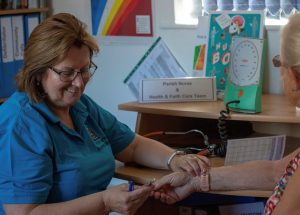 Parish Nursing Ministries UK (www.parishnursing.org.uk) support Christian communities across the UK to establish Parish Nursing services, promoting health and well-being. Every Parish Nurse is a Registered Nurse, employed through a local church or Christian organisation.
Parish Nursing Ministries UK (www.parishnursing.org.uk) support Christian communities across the UK to establish Parish Nursing services, promoting health and well-being. Every Parish Nurse is a Registered Nurse, employed through a local church or Christian organisation.
Through the Roof and Parish Nursing have been able to work side by side, and here we see what a difference Madeleine has been able to make for those in her church.
We love to hear about and celebrate disability inclusion in Christian life. Our Luke 5 Award is for any disabled person to make a nomination to recognise the difference that’s been made. Follow this link to make a Luke 5 nomination.
Understanding Hidden Disabilities in the Church
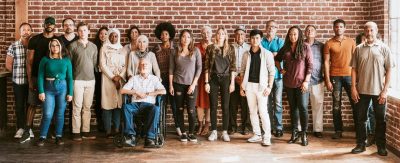
Walking into a church can feel daunting for anyone, but for people with hidden disabilities, this seemingly simple act can be a considerable barrier to overcome. If a church is unaware of its potential impact on people with hidden disabilities, it can lead to feeling isolated, excluded and unwelcome.
It’s essential that churches make sure everyone feels welcomed as part of the community – not just accepted but embraced too.
In this blog post, we’ll examine what these hidden or non-visible disabilities mean, highlight frequent misconceptions, and discuss how churches can embrace people whose conditions might usually stay unseen.
Key takeaways
- Hidden disabilities are conditions that can limit daily activities yet may not be readily visible to others. We need to challenge common misunderstandings that if a disability is less visible, it must be less severe.
- It is important to remove barriers and promote inclusivity for those with visible or invisible disabilities.
- The church can create an inclusive environment by recognising signs of hidden disabilities, offering support and understanding, providing assistive devices/mobility aids, supporting people by making reasonable adjustments (e.g. allowing people to sit to sing) & raising awareness about such conditions.
What are hidden disabilities?
A hidden disability, also known as an invisible disability or non-visible disability, is a physical or mental impairment that isn't immediately apparent to others. Unlike visible disabilities, easily identified through physical signs or mobility aids, hidden disabilities cannot be clearly seen from the outside. Despite not being immediately visible, these disabilities can significantly impact a person's daily activities, overall functioning, and well-being.
Examples of hidden disabilities
Here are some examples of hidden disabilities that you might encounter in your church, workplace, or community, but it's certainly not an exhaustive list:
- Chronic pain: Many different conditions, including fibromyalgia, complex regional pain syndrome (CRPS), and certain types of arthritis can lead to severe pain and discomfort, even though there may not be any visible signs.
- Mental health conditions: Mental health conditions like depression, anxiety disorders, bipolar disorder, and post-traumatic stress disorder (PTSD) are often classified as hidden disabilities because their symptoms are internal and not always apparent to others.
- Neurological conditions: Neurological conditions such as epilepsy, traumatic brain injury, multiple sclerosis (MS), and certain types of migraines can cause significant impairment, even without visible physical symptoms.
- Chronic illnesses: Chronic illnesses like irritable bowel syndrome (IBS) or chronic migraines may not have visible symptoms but can significantly impact a person's daily life. Chronic Fatigue Syndrome (CFS) is another example: CFS sufferers experience extreme fatigue and other symptoms that are not immediately noticeable to others.
- Autoimmune disorders: Autoimmune disorders like lupus, Crohn's disease, type 1 diabetes, or celiac disease can affect various organ systems and cause symptoms that are not externally visible.
- Learning disabilities: The impact of learning disabilities can be great, but they are often not obvious. According to the UK charity Mencap, Learning disabilities are when a person has a reduced intellectual ability and difficulty with everyday activities. (A learning disability is different from a learning difficulty, as a learning difficulty does not affect general intellect - see below.)
- Neurodivergence and learning difficulties: such as dyslexia, dyscalculia, attention-deficit/hyperactivity disorder (ADHD), or autism spectrum conditions can impact people’s lives hugely without visible signs.
- Sensory processing disorders: Conditions that affect how the brain processes sensory information, like autism or sensory processing disorder, may not have visible indicators.
The church, in particular, should support those with hidden disabilities, creating a more inclusive atmosphere, so that everyone feels fully able to access, participate in and contribute to church activities. People facing difficulties due to their invisible conditions may experience obstacles, including misunderstanding by others or a lack of acceptance, which makes it hard for them to cope with the situation without proper support from others.
How many people have hidden disabilities?
It is believed that approximately one in five individuals across the UK have a hidden disability which can hinder their daily activities yet may not be readily visible to others. It is also estimated that 70-80% of disabilities are non-visible. Contrary to common beliefs, these disabilities are just as serious and valid as other visible impairments.
Defining the number of people with less visible impairments can prove challenging, but the number of people is likely to be greater than government findings show, as examples could include those living with undiagnosed conditions like early-onset dementia, as well as conditions already mentioned such as fibromyalgia, multiple sclerosis, Lyme disease and autoimmune issues.
Dawn's story
The best way to understand the impact of hidden disabilities is to hear from someone who has one. Here is a testimony shared by a church member on Disability Awareness Sunday.
"My name is Dawn and I have hidden disabilities. The main symptoms I battle with are Chronic Pain and Physical and Mental fatigue.
One major challenge I face is that my abilities and needs vary from day to day because my pain and fatigue fluctuate. Some days I need bed rest or mental rest in a quiet environment, on other days I can interact in larger groups and manage a lot of communication.
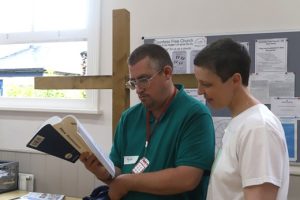 Sometimes people expect me to be able to do more than I am able because I look well. Then at other times, people don't ask me to do things when I am able because they don't want to overload me. I would always encourage you to ask the person what they feel they can give rather than to assume you know.
Sometimes people expect me to be able to do more than I am able because I look well. Then at other times, people don't ask me to do things when I am able because they don't want to overload me. I would always encourage you to ask the person what they feel they can give rather than to assume you know.
Planning things can be a challenge as when I look at my calendar to book events I don't know what my pain and fatigue levels are going to be like on this day. This can result in me doing too much because I don't like to let people down if I have committed to something.
Due to this I have been unable to have a paid job for the past 20 years and serve instead in voluntary roles that I can lay down. This has been an area I have had to learn to trust God's provision in.
I do get frustrated when my body and mind can't keep up with my desire to be active and serve. However, God has taken me on a journey and I have learnt from my disability that in order to function well, I need to live at a slower pace.
I have learnt that there is much blessing to be found in learning to slow down and live in the present moment. I hear God speaking more clearly as I take time to rest in his presence and seek to know what is on His heart.
I have found a deeper place of daily peace as I have learnt to surrender the need to be in control. God has taught me that He can be trusted to provide for my every need and work out circumstances in which I need a breakthrough; all He asks me to to is trust him and pray."
Dawn's story shows us that people with hidden disabilities face many challenges, but they are still used by God to serve Him, and their lived experience of disability can bring a lot of wisdom.
Common misconceptions
There are several common misconceptions about people with hidden disabilities, which can contribute to stigma and misunderstanding.
Here are some of these misconceptions:
- Misjudging people’s disability status: A common misunderstanding is that if a person doesn't show physical signs of disability, they must not be disabled. This can lead to scepticism or disbelief when individuals with hidden disabilities request reasonable adjustments or support for themselves, to have equal access.
- Doubting the severity: Some people may think hidden disabilities are less severe than visible ones. This misunderstanding overlooks the fact that hidden disabilities can significantly hinder a person's daily life, functioning, and overall well-being.
- Believing they're overstating: There is a misconception that individuals with hidden disabilities may be overstating their conditions or using them as excuses. This can lead to doubts about the legitimacy of their challenges and the need for support.
- Expecting consistent symptoms: People often expect individuals with hidden disabilities to be consistently "disabled" or symptomatic. However, many non-visible conditions can have fluctuating symptoms, meaning that someone may have good and bad days, or moments of being able to function well.
- Underestimating the impact: Many people underestimate the profound impact hidden disabilities can have on a person's life. They may not realise individuals' challenges in managing their conditions and the effort required to participate fully in society.
- Expecting visible indications: There's often an expectation that people with hidden disabilities should display visible signs of struggle or discomfort. When they don't, others may question the legitimacy of their needs.
- Believing people don't need support: Some individuals may think that because someone appears ‘normal’, they do not require any extra accommodations or support. This assumption can hinder access to necessary resources and help.
- Making assumptions about their abilities: People might judge what individuals with hidden disabilities can or cannot do based on their condition, overlooking their unique strengths and capabilities. Fluctuating symptoms add to this, so people with non-visible disabilities may be overlooked for a task, on an assumption of ill health.
- Stigmatising mental health: There can be significant stigma and misunderstandings in the case of hidden mental health conditions. People may wrongly assume that individuals can "snap out of it" or that their condition is less serious than physical disabilities.
It's crucial to challenge these misconceptions and foster a more inclusive and empathetic society. Churches in particular can play a key role in recognising that hidden disabilities are genuine and serious, and providing the necessary support and accommodations to help individuals thrive despite their challenges. Education and awareness can play a significant role in making this happen.
The truth is that hidden disabilities come in various forms; some may have permanent, continuous symptoms, while other symptoms may fluctuate. However, the impact on people's lives can be considerable, and the reasons behind their need for support can be complex. Any disability, visual or not, should not stop anyone from participating in church life. As Christians, we're called to love our neighbours, which also means creating an inclusive culture.
Hidden disability vs. invisible disability vs. non-visual disability: What is the right term?
It is essential to recognise the existence of disabilities that are not immediately observable. Terms like hidden, invisible and non-visible disability are often used interchangeably but refer to those conditions which aren’t easily seen by others.
People within the disability community have different views on the right term to refer to disabilities that aren't immediately obvious by looking at a person.
‘Hidden disability’: Hidden disability is the most commonly used term. However, some consider the term offensive as it could be argued that it suggests people purposefully withhold the fact they have a disability. There is a difference between choosing not to self-disclose that you have a disability versus actively hiding it.
‘Invisible disability’: For some people with disabilities, this term is also offensive. It suggests the person is not visible or that you cannot discern that a person has a disability, which is not always true. Non-apparent disabilities may become apparent, depending on the type of disability.
‘Non-visible disability’: More recently, the term non-visible disability has been used. You can find it on UK government websites in particular. It's a newer term, and, as such, not many people identify with it yet, but its use is growing. However, arguably, the same is true for ‘non-visible disability’ as for ‘invisible disability’ - that it could be taken to imply a general lack of visibility for the disabled person, though that is not the intention of the term.
The impact of hidden disabilities on daily life
Hidden disabilities can present a range of difficulties to the people they affect,from stigma and impaired accessibility to employment discrimination. Individuals with such impairments may have difficulty engaging in day-to-day activities. It is essential that the church takes action by offering support and acceptance for all members regardless of their physical or mental abilities. This enables their full participation within church life so they are not left feeling excluded from everyday activities due to any hidden disability issues they face.
Stigma and misunderstanding
The church can play a role in breaking down the walls that separate people with hidden disabilities and creating an atmosphere of acceptance by raising awareness about these conditions. With increased understanding, everyone who faces discrimination due to their invisible struggles will have access to much-needed support and be welcomed within the church family. These efforts make people feel less alone and isolated by society’s attitudes.
Accessibility challenges
Individuals with hidden disabilities may experience a lack of recognition and assistance. This can leave many obstacles preventing them from taking part in church and community life, which at best leads to displeasure for these individuals, and at worst can lead to loneliness and alienation. To foster inclusion within the church setting, appropriate arrangements should be made to allow all to participate in worship services, as well as other group activities. However, access is not the only step that is needed for full disability inclusion.
Not being enabled to serve and to belong
A common issue for people with disabilities - including those with hidden disabilities - is the sense of being overlooked, so their gifts and talents are not being recognised or used in church life. In an eagerness to respond to hidden disabilities, churches can make assumptions about what people can or can’t do, without asking the individuals concerned. This can lead to a sense of frustration at not being able to serve or take on responsibilities. Fluctuating symptoms can be common with hidden disabilities, so don’t assume people are unable to do help due to their disability. The best thing is to ask in each instance. Using our God-given gifts is so important to each of us, so we feel we belong as part of the community.
Employment discrimination
To dismantle barriers and create a more inclusive workplace for individuals with hidden disabilities, it is essential to increase awareness and establish effective policies. Hidden disabilities can significantly impact one’s ability to secure gainful employment, attain higher wages, or experience job satisfaction—issues that must be addressed to eliminate discrimination in society. Churches can lead by example, ensuring they are modelling best practice in equal opportunities, and advocating for people with hidden disabilities, so the church helps everyone to have equal access to finding meaningful work or employment.
Identifying and supporting hidden disabilities in others
The church can foster an environment where everyone feels welcomed and accepted by noticing signs of hidden disabilities, providing support, and promoting disability inclusion. Identifying those with hidden disabilities and discreetly providing any support they need, allows them to grow without prejudice or judgement while giving essential care for their unique needs.
Recognising signs and symptoms
Church members should look out for signs and symptoms that could suggest a hidden disability so they can offer support, where needed. Possible signs might include wearing hearing aids, injecting medication, or needing time out from a noisy room. However, there may be no outward signs, so it is up to the individual whether they want to tell others about any disability. It is important to respect privacy and not force people into sharing personal information. Recognising any signs and symptoms is a useful step though, so you can discreetly offer appropriate aid when necessary. But do not be offended if it is not accepted.
Offering support and understanding
Providing assistance, compassion, and understanding can significantly help those with hidden disabilities. With support from their church community, they may feel appreciated and accepted within it. It is vital to bear in mind that individuals might be unable to communicate how they feel effectively, due to hidden disabilities preventing them from doing so, or because they have experienced negative attitudes in the past. This means offering help is all the more valuable. Encouragement could make a huge difference among people suffering silently with invisible impairments.
Making it possible for everyone to take part
Providing physical access, granting accommodations or adjustments as needed, and fostering an inviting atmosphere can all contribute to making sure people with disabilities have full involvement within church life. Sometimes what people need is just a small thing that can make a big difference - such as a chair with arm-rests, located near the door. Sometimes the needs might mean more organisation, such as a sign language interpreter, or subtitles and voice over adding to a video. Whatever the need, it is important to do something about needs presented in a church or community, so everyone is included.
Support and accommodations for people with hidden disabilities
To create a warm and accepting environment for all, including those with hidden disabilities, providing support is key. This could include offering assistive devices or raising awareness about different types of conditions to increase understanding. Advocating for inclusive policies that ensure everyone is accommodated also helps fulfil the church’s mission. All these efforts empower people living with disabilities so they have equal opportunities in church and community life.
Assistive devices and support aids
Having support aids available can help with certain hidden disabilities. 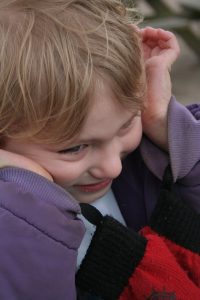 For autistic individuals, these might include ear defenders or a quiet areas to help combat noise - or fidget toys, or colouring sheets, which may act as an aid to concentration. For others it may be as simple as not requiring everyone to stay standing for long periods, or having some chairs available at a standing event. Access to such additional resources can allow those with a hidden disability to participate fully in church services, activities and community engagements. Providing such helpful assistance can empower disabled individuals who may otherwise face difficulties integrating into society due to barriers they confront on a day-to-day basis.
For autistic individuals, these might include ear defenders or a quiet areas to help combat noise - or fidget toys, or colouring sheets, which may act as an aid to concentration. For others it may be as simple as not requiring everyone to stay standing for long periods, or having some chairs available at a standing event. Access to such additional resources can allow those with a hidden disability to participate fully in church services, activities and community engagements. Providing such helpful assistance can empower disabled individuals who may otherwise face difficulties integrating into society due to barriers they confront on a day-to-day basis.
Raising awareness and advocacy
By raising awareness and advocating, the church can create an atmosphere of acceptance for individuals with disabilities. Through education on hidden impairments and pushing for comprehensive policies that embrace diversity, understanding is fostered to ensure everyone within the congregation has equal opportunity.
Accommodations and reasonable adjustments
The church can provide equal opportunities for people with invisible disabilities by creating reasonable adjustments. These could include ergonomic furniture, assistive technology and flexible work hours to enable access to available mental health services. By offering these accommodations, individuals affected will be able to participate actively in worship activities and community life despite any difficulties they may have due to their hidden disability or ailments related to that.
The hidden disabilities sunflower initiative
The Hidden Disabilities Sunflower Initiative strives to make hidden disabilities more recognisable and understood by the public through raising awareness about them. By providing a discreet ID symbol for those with invisible ailments, it encourages acceptance and breaks down any barriers caused by lack of knowledge or understanding.
Origins and Purpose
The Hidden Disabilities Sunflower Initiative seeks to create a more comfortable and accepting atmosphere for people with hidden disabilities when they go out. Through raising awareness of their condition so that society is better informed about it, churches may be able to provide suitable support and aid them as equal members into all its activities.
How It Works
The Hidden Disabilities Sunflower Initiative is a service that helps people with hidden disabilities to communicate their needs and access required assistance. This is done through an identifiable symbol – such as a sunflower lanyard – allowing those living with invisible impairments to show others, like personnel or healthcare professionals, what they may require.
Impact on Awareness and Acceptance
The Hidden Disabilities Sunflower Initiative has effectively raised awareness and acceptance of hidden disabilities. This unique initiative offers a discreet way for people with invisible impairments to alert service providers that they may need additional help or assistance, ultimately reducing misunderstanding towards those living with undisclosed conditions.
You can read more about this initiative in our blog The sunflower lanyard and what churches should know about it.
Accommodating hidden disabilities in the church
Creating an atmosphere of acceptance, accommodating different needs and engaging with those with hidden disabilities are all essential components in fostering a church that is open and accessible to everyone. By considering potential obstacles ahead of time, the church community can ensure it remains inclusive for individuals regardless of their abilities.
Culture of acceptance
The church can create an atmosphere of acceptance by recognising signs and symptoms associated with hidden disabilities and fostering understanding and empathy. This will help eliminate any barriers to participation in the congregation for those living with a disability they may feel uncomfortable discussing, enabling them to be welcomed into a supportive environment.
Willing to change
To make a church atmosphere accessible for everyone, the willingness to change and adjust is necessary. By setting up relevant assistance as well as spreading inclusivity, people with concealed disabilities can better take part in services, events and life among congregation members. Creating an inviting environment where everybody feels included is essential for a church’s success, particularly for individuals dealing with impairments.
Anticipatory duty
The church should anticipate potential obstacles for those with disabilities and strive to overcome them. This includes providing physical access such as ramps or elevators as well as accommodations such as allowing people to sit to sing or providing access to large print song sheets. By taking a proactive approach, the needs of people with disabilities can be properly met so they do not encounter barriers due to their condition.
Speak to people with hidden disabilities
By talking with individuals with hidden disabilities, the church can gain an understanding of their unique challenges and create a more inclusive atmosphere. This communication allows needs to be met, fostering an environment that supports all its members.
Summary
We should strive to make our church an inclusive and supportive environment by understanding hidden disabilities, offering suitable accommodations and support, and promoting disability inclusion as well as accessibility for all members. By doing so, we can ensure that everyone can participate in worship or community life without discrimination according to their abilities. Let us accept the diversity of people within our congregation while working collaboratively to create a place where everyone feels accepted and appreciated equally.
Further support for churches
Through the Roof’s can support your church with practical ways to support people with hidden disabilities. Our Roofbreaker project can provide you with free resources, such as the Church Disability Toolkit and Removing Barriers audit.
Click on the following link to become a Roofbreaker and join with over 600 others across the UK as part of a growing network who are actively making adaptations for disabled people to access and belong to God’s family.
New life in Nigeria 2024 Wheels for the World blog
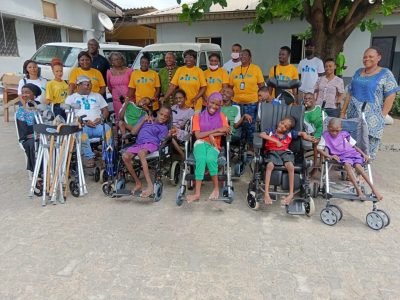
Our Wheels for the World team in the UK helped support the distribution of life-changing mobility aids to many disabled people in Lagos and Delta State, Nigeria, in March/April 2024.
Over 80 million disabled people worldwide need a wheelchair but don’t have the money or opportunity to buy one (WHO). Wheels for the World seeks to change that situation by refurbishing disused wheelchairs from donors in the UK, including the NHS, making them as-new. The chairs are then shipped overseas and therapists fit them to individuals' needs.
Bringing freedom
In March 2024, we partnered with the charity Osteogenesis Imperfecta Foundation Nigeria whose therapists fitted local disabled people with appropriate equipment. Over 200 mobility aids and 140 wheelchairs were distributed, which had been refurbished in our UK Wheels for the World warehouse. Our UK team of therapists and techies were available online to support the remote distribution. Many of the disabled people had never had a wheelchair before, or were using old or broken equipment that was not fit for purpose.
The team also gave out 250 Bibles to individuals - giving spiritual as well as physical freedom to all. It was such a blessed event. Disabled individuals ranging from age 2 to over 50 years old were given equipment to rejuvenate their lives and empower them for a more positive way of living.
The supported Wheels for the World distribution was organised by Tarela Aghanti, Director and Founder of Osteogenesis Imperfecta Foundation Nigeria (OIF Nigeria). Tarela led the local team on the ground, sending stories and images of the many lives changed for the better on the mission. Here are just a few of the stories she shared about the impact of this work.
Modupe Cole Memorial Childcare Home
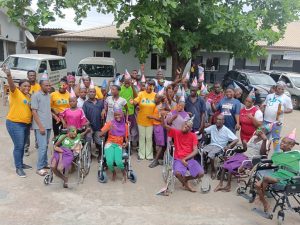 The mission team visited one of the oldest children’s homes in Lagos, the Modupe Cole Memorial Childcare & Treatment Home School. They were able to present 19 wheelchairs, 5 crutches, 4 walking sticks, 3 tri-walkers and 1 walking frame - along with stationery items as well as food and clothing. The children were so excited at the gifts and were dancing and filled with joy. The experience was not all positive however, as the team found the facilities at the home showed a great need for investment in equipment and more opportunities for the children to interact with others and learn/develop. We pray that the local government and community will recognise the need to support and encourage these disabled children. We were glad to be able to bring them some gifts and showed that people care about their needs.
The mission team visited one of the oldest children’s homes in Lagos, the Modupe Cole Memorial Childcare & Treatment Home School. They were able to present 19 wheelchairs, 5 crutches, 4 walking sticks, 3 tri-walkers and 1 walking frame - along with stationery items as well as food and clothing. The children were so excited at the gifts and were dancing and filled with joy. The experience was not all positive however, as the team found the facilities at the home showed a great need for investment in equipment and more opportunities for the children to interact with others and learn/develop. We pray that the local government and community will recognise the need to support and encourage these disabled children. We were glad to be able to bring them some gifts and showed that people care about their needs.
‘Special Eagles’ Amputee Football Team
Disability affects us all, including sports people. Tarela from OIF Nigeria was contacted by the 'Special Eagles' amputee football team who represent the whole of Nigeria, asking if they could receive mobility equipment to help them compete in football matches. So the mission team found themselves in contrasting surroundings, moving from a children's home to the giant National Stadium! The captain of the amputee football team, Sarafadeen Oyeleke, said: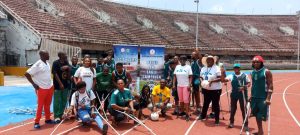
"I extend our heartfelt gratitude for your generous donation of pairs of crutches to twenty amputee players, both male and female. Your timely gesture has provided essential support that is invaluable to our team. The significance of these crutches cannot be overstated. They are not merely tools for mobility, they are fundamental to our ability to participate in amputee football. Your generosity will undoubtedly motivate and inspire our team as we prepare for the African Amputee Nations Cup in Egypt.”
Meet Perry
It was a positive atmosphere at the wheelchair distribution in Lagos, Nigeria. Perry, the youngest of the wheelchair recipients, has a brittle bone condition. He did not have a wheelchair, so had to be carried everywhere.
His mother, Mrs Sekinat, said: "Perry was born with osteogenesis imperfecta (OI) also know as brittle bone disease: a condition that causes the bone to fracture or break easily. I wasn't aware of my son's condition until I had a scan at 7th month of his pregnancy, then the sonographer told me my son's limbs are short that he is likely to have Dwarfism. When I gave birth to him (normal delivery), his legs were bowed. I think he fractured when I gave birth to him, as I carried him home and he cried often - then his hand was swollen like the bone was broken."
Mrs Sekinat was full of joy as she pushed her son home, strapped into his new chair. Perry's was dancing with excitement at getting his own wheelchair!
Thank you, Mr Friday!
Meet Dare
Meet Dare, aged 30, from Lagos, Nigeria - whose life is transformed through the gift of a wheelchair. Dare is a graduate of Biology Education who came to the Lagos wheelchair distribution to find help so he could continue his studies. He says: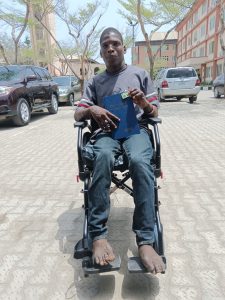
"I am living with cerebral palsy as occasioned from birth. Its been very challenging growing and having to go through my day to day activities. It really has been traumatising for knowing I can't lead a normal day to day life like my peers. Academically, it was frustrating because there were no specialised centres where I could write my entry examination. As a result I couldn't score the required mark to study my preferred course Medicine and Surgery.
Disability inclusion framework ABC: Spring 2024 Vital Link Newsletter
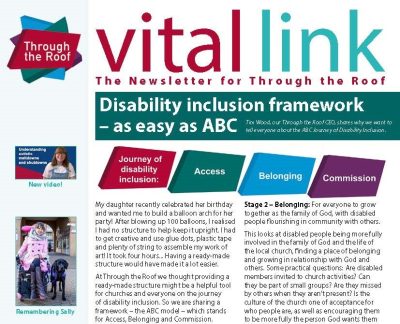
Welcome to the Spring 2024 Vital Link newsletter from Through the Roof.
Download your copy to:
- read all about our new framework: the ABC Journey of Disability Inclusion, and how to apply it in your church
- watch our new video 'Understanding autistic meltdowns and shutdowns' and share it with others
- meet our new Chair of Trustees, Trevor Hahn, as he celebrates the ministry, witness and life of former Chair, Mike Townsend
- read the life-changing stories of Saroop and Jerome, from our recent International Roofbreaker mission trip to Kerala, India
- be reminded that you only need to 'Ask and you shall receive', and that fundraising doesn't need to be complicated
- and much more...
-
-
-
-
-
- Follow this link to download the PDF of the Vital Link SPRING 2024 newsletter
- Or contact us on 01372 749955 or email info@throughtheroof.org to request a different accessible format
- Or read Vital Link onscreen with the Joomag viewer below:
Open publication - Free publishing -
-
-
-
Book review: Loving Our Own Bones
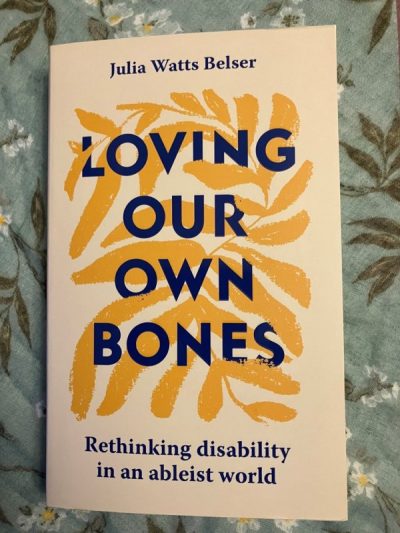
Becky Clegg, a Roofbreaker with personal experience of disability, reviews 'Loving Our Own Bones: Rethinking disability in an ableist world' by Julia Watts Belser
In her latest book, 'Loving our Own Bones', Watts Belser offers a glimpse into disability, aiming to address key questions of inner life and spirituality. She draws some fascinating insights from scriptures that may not be the first to come to mind when grappling with theology through the lens of disability. In this respect, her biblical explorations are quite refreshing and will be my focus here. However, readers should be aware of Watts Belser’s background as a Jewish rabbi, where the need for Jesus as the promised Messiah is overlooked.
God on wheels
'Loving our Own Bones' opens with a rather picturesque account of daily life and getting around with a disability. Seeing her walking gait as having a ‘distinctive rhythm’ had me smiling in recognition. Others may appreciate the tangible ‘wheels rolling over tarmac’. This leads into Watts Belser’s notion of ‘God on Wheels’, born of her identification with Ezekial’s vision of God appearing ‘on a vast chariot, lifted up by four angelic creatures with fused legs, lustrous wings, and great wheels’. God is seen as identifying with the joys and freedom of freewheeling, as well as the pains and frustrations of negotiating obstacles along the way; (obstacles being the disabling factor, not impairment itself, according to the social model of disability highlighted here).
With the final chapter of 'Loving our Own Bones' also devoted to ‘God on Wheels’, Watts Belser speculates on God’s own body. It may seem fair enough that this line of thought is based on the biblical concept of everyone being born in God’s own image. However, trying to humanise God dismisses God’s omnipresence and divinity which spans beyond any human understanding. At least one paragraph is a direct repetition of one found in the opening chapter. It is beautifully descriptive and underlies Watts Belser’s enthusiasm for the concepts, but also shows that there is only so far one can go when limiting God to human understanding.
Wrestling with disability in the Old and New Testaments
Notwithstanding, readers will likely resonate with issues that Watts Belser draws on from following key Old Testament characters. Moses’s bargaining with Pharaoh (to free the Israelites from Egypt) was hesitant on account of his speech impairment, which seems reasonable to me as someone who shares this disability. However, Moses is then equipped just as God needed him to be. I say needed, as it is then suggested that God needed Moses to fulfil this rescue plan. This may be so, but the passage shows how God crafts His plan and who He has chosen to carry out His mission. Watts Belser helpfully quotes the verses to say that it is all the Lord’s doing. Additionally, God has already ensured Moses will be supported. Not only is Aaron prime candidate as his brother’s spokesperson; their intimate connection is foreseen to provide moral support. Yes, relying on support can be frustrating if it goes wrong, as the text explores, but this interdependence is a helpful picture of what God intended for his church.
Turning to the New Testament, we see the account in Luke's Gospel of the woman enduring eighteen years of bent posture and pain. Here, the contentious issue of healing is laid bare. Whatever your personal stance, Watts Belser’s focus on the woman’s anonymity seems to be a vehicle for her frustration with ‘overcoming disability’ headlines.
Watts Belser’s critical approach in 'Loving our Own Bones' also shows in her ‘hatred’ of the story of Isaac’s blessing getting mixed up between his sons Jacob and Esau. Isaac is subjected to expectations of disabled people working around their impairments. Her assertion that this story ‘gets disability wrong’ suggests Watts Belser’s limited understanding of the characters as individuals.
Clear acceptance and 'loving her own bones'
Watts Belser concludes her search for answers or healing with a clear acceptance of who she is meant to be, whatever the reason, and ‘loving her own bones’. There are many times when we will choose to share and educate, as Watts Belser does in many instances recorded here, but this is where we are personally guided. This may go some way to healing at a societal level, if the disabling obstacles lie within societal attitudes, Watts Belser argues.
In sum, in 'Loving our Own Bones', Watts Belser makes an impressive attempt to wrestle with a range of issues concerning disability and faith, with a deeply personal touch. You may identify with the amusing anecdotes of daily life littered through the text. However, the text does leave you wondering about Watts Belser’s exact relationship with God and what her purpose is here.
'Loving Our Own Bones' by Julia Watts Belser is published in the UK edition by Hodder & Stoughton (ISBN 9781399804240)
International Roofbreakers in Kerala, India, 2024
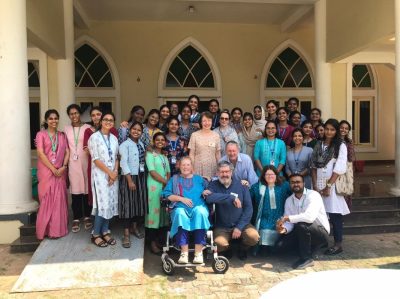
Our first International Roofbreaker mission trip to Kerala, India, in January 2024 had a profound impact. It touched the lives of at least 135 disabled people and family members. The trip also addressed the hearts and minds of over 200 local Christian leaders, teachers and students, giving them a more Biblical view of disability inclusion.
We were told that very often in India, disabled people are separated from the rest of society, and sadly most churches do not include any disabled people at all. The Kerala International Roofbreaker mission made an immediate difference to this situation.
A group of six team members from the UK visited Kerala and joined with local Christians from our partner organisation, Sathyam Ministries. The volunteers shared about the Biblical basis for valuing and including disabled people, and how this can be done in practice. The message was strengthened by the fact that the Roofbreaker team included UK volunteers who are disabled themselves. Many pastors from Kerala pledged to change things in their churches and to reach out to local disabled people.
International Roofbreakers missions provide pastoral support for the local disabled people who received wheelchairs and mobility aids the year before, in our Wheels for the World mission.
God has given us a vision for International Roofbreaker events to train and encourage local churches in developing countries to support and value disabled people in their communities. To do this, we invite local Christians to become International Roofbreakers, or disability champions, who break down barriers to full inclusion in church and Christian life.
In the blog posts below, Anne, a UK Roofbreaker, shares her experiences from the Kerala trip, and the many ways it encouraged local disabled people and educated the community.
Arrival in Kerala
"On the first day, we were invited by our host, Dr. CV, to a get-together, known as ‘Ability Meet.’ As soon as we arrived, we were greeted by a sea of smiling faces. A terrific welcome: everyone seemed pleased to see us and we were presented with flowers.
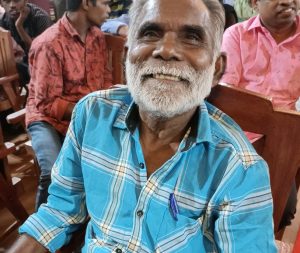 We were able to speak, through an interpreter, sharing a little about Through the Roof, and also to meet and chat with people. Some of those we met had been given wheelchairs from Through the Roof previously. A lovely man, with a terrific smile, disabled as the result of an accident, commented on how the gift of a wheelchair enabled his independence. He is also reading his Bible.
We were able to speak, through an interpreter, sharing a little about Through the Roof, and also to meet and chat with people. Some of those we met had been given wheelchairs from Through the Roof previously. A lovely man, with a terrific smile, disabled as the result of an accident, commented on how the gift of a wheelchair enabled his independence. He is also reading his Bible.
One particularly amazing granddad had enough English to tell me his granddaughter has an extra chromosome-18, a condition also known as Edward’s syndrome.
This granddad has a terrific faith. The doctors predicted that his granddaughter would only live for two years, but she is eight years old, and she is starting to talk and make progress. He gives God the glory.
He said ‘medical science can fail, but God doesn't fail – my granddaughter is alive because Jesus is alive’. He said she worships with them. He takes her everywhere, as a witness to the faith. This man and others were a real blessing to us."
Another packed but rewarding day
"Today we visited local people at home. All the families had a member who is a wheelchair user.
The first lady we saw is called Pennamma, she is 97 years of age. Martyn, our team leader remembers her from when she received her wheelchair from us on the Kerala Wheels for the World trip. Pennamma was using the wheelchair when we saw her. She spoke about having reached the age of 97 and being happy for God to call her home. Her favourite Bible passage is Psalm 23. The Lord is indeed our Shepherd and He has guided Pennamma through 97 years!
In the next home we visited, the family have a small boy called Aardhil. He was making good use of the wheelchair we previously gave him. The family said that the wheelchair acts as a ‘pacifier’, calming him when he is stressed. It also enables his brother, and the rest of the family, to take him for a walk in the local area.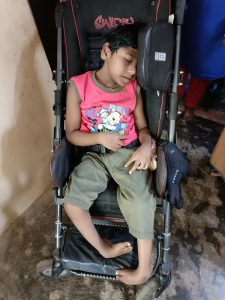
This little boy, Aardhil, has no sight. He had a cornea transplant operation recently, but this was not successful, and the family have asked for prayer. He has hearing and was able to respond to us by waving. He likes music and listens to Christian worship songs.
The main thing that has struck me, throughout the trip so far, is the level of care and support shown to each individual person by their families. It is very humbling. We hope to inspire the local community to offer support as well, so everyone can belong and play their part in life."
Inspiration from the young and old
𝗧𝗵𝗲 𝘁𝘄𝗼 𝗠𝗮𝗿𝘆𝗮𝗺𝗮𝘀
“Yesterday morning we met two elderly ladies, both named Maryama! They also both have a strong Christian faith. The simple faith of the people we have met has really touched us.
The first Maryama has a favourite Scripture passage: Psalm 91. She can't see to read, but the Bible passages are written in her mind and on her heart.
Eighteen years ago, this lady nearly died. The doctors told her to prepare for her death (literally they told her to buy a coffin). She had faith in God though, that it wasn't her time.
She didn't die and her daughter-in law, who cares for her, heard a voice from heaven saying 'You've got your Mother back, now care for her’, and she does.
The second Maryama has been bed-ridden for two months, due to diabetes. Sadly, she can't really use her wheelchair now, and finds it hard to praise God; I believe she still praises God, in her heart. One of our team sang a praise song to her – with actions! It lifted her spirits."
𝗛𝗼𝗺𝗲 𝗼𝗳 𝗛𝗼𝗽𝗲 𝗼𝗿𝗽𝗵𝗮𝗻𝗮𝗴𝗲
"In the afternoon, we visited the children's wards of an orphanage. It had beautiful gardens outside. We were all touched by the level of care given to these children by the nuns who run it. Many of the children have severe disabilities. Several children had received wheelchairs from Wheels for the World – many with decorations on. The wheelchairs had totally transformed their lives. They can sit up and look around for the first time.
The children were full of smiles. Several of the children sang for us. One blind girl had a little English. Another girl could point to India on a map and correctly identify an eagle in a book.
Tragically, these children are mainly unwanted by their parents. They were all friends, and they held hands. The orphanage touched the hearts of all of us." We pray the children will be blessed."
Local church leaders catch the vision
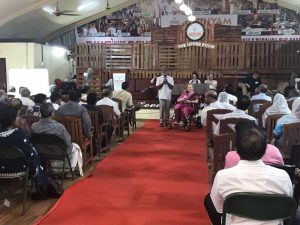 Our UK team leader Janet spoke, from John's gospel, explaining that disability is not a curse or a punishment from God for the individual’s sin or the sin of the parents. This is a common misconception here and may lead to disabled people being shunned within society. Martyn spoke on being adopted in God's family and Abigail sang and gave a word of testimony.
Our UK team leader Janet spoke, from John's gospel, explaining that disability is not a curse or a punishment from God for the individual’s sin or the sin of the parents. This is a common misconception here and may lead to disabled people being shunned within society. Martyn spoke on being adopted in God's family and Abigail sang and gave a word of testimony.‘We need to be like Jesus’
"This is our final blog, reflecting on our last day of Roofbreaker events, before our team day out to close the trip (to see more of Kerala with an enjoyable trip to the elephant sanctuary).
Yesterday, we were speaking again, to pastors, church leaders and Sunday school teachers. The meeting opened in prayer. Students from Justin's Home performed music for us again, singing and playing musical instruments. The meeting then began, as we discussed feedback from the previous day, and gave a response to some of people's questions. We read from the Bible: the ‘Good Samaritan’ and the ‘Sheep and the goats’.
Next, Jewels gave her testimony, explaining her lived experience as a disabled Christian. Afterwards, Abigail interviewed two local disabled Christians about their stories. They both enjoyed church, listening to testimonies, and praising God. Justin, Dr CV’s son, thanked God for his parents and siblings. Martyn spoke on ‘Glorifying God' and Janet talked more about what it means to be a Roofbreaker.
Finally, we asked a question: ‘After what you have heard over the past two days, what one thing will you implement, in order to show you include and value disabled people?'
People responded very well to the whole event. They commented that they particularly enjoyed Jewels’ testimony. One man mentioned that he had never thought about people with disabilities before, now he will. Several leaders said they are going to implement changes.
One very special attendee stood up at the end and gave a word of testimony. He has a hidden disability. The whole message, from us and our Indian brothers and sisters can be summed up in the words ‘We need to be like Jesus’."
Your support means so much
If you would like to get involved with International Roofbreaker missions through prayer or volunteering, visit our International Get Involved page. If you're interested in joining a trip (volunteers need to raise funds for their own costs and air fare) visit our Planned trips page or email Shaun@throughtheroof.org
Please consider donating funds to this Gospel-centred work: your support means so much to us and to the disabled communities in the developing countries we reach.
News release: Understanding autistic meltdowns and shutdowns video
Triona Brading, an autistic Christian who is a Roofbreaker disability champion with Through the Roof, has teamed up with the charity again for a second video: ‘Understanding autistic meltdowns and shutdowns.
Triona shares “helpful starting points for discussions with the autistic people in your church” to create awareness and begin dialogue, so autistic people can feel at home.
What does the video cover?
The new video explains the difference between two different responses an autistic person may have to feeling overwhelmed: an outward response (a meltdown) and an inward response (a shutdown).
It gives useful tips on how to prepare in advance for meltdowns and shutdowns, talking to autistic individuals before anything happens about what support or help they may want. It also covers what you could do if a meltdown or shutdown emotional response is already happening. For a run-time and content list, see the video description on YouTube at the video link here https://youtu.be/aDD8-exFb-s
Advice from Triona is: “If it’s possible, in the space that you have, and the setting that you’re in, you might want to think about a plan for if someone is experiencing a meltdown.”
A more inclusive church for autistic people
Church can be a difficult and confusing place for autistic people, but it doesn’t have to be that way. This video aims to help people in churches learn how to create a more inclusive church environment for autistic people, with practical tips and advice that can be easily and quickly implemented.
Triona, an advocate for making the church a more accessible place for autistic and neurodiverse people, released the video as the second in her series of Autism and neurodiversity videos for churches @TTRChangesLives on YouTube. The first in the series is called 'Supporting autistic individuals in our churches', and is available at the series link above.
“The best thing you can do is talk to autistic people you know that come to your church groups and services, and see what they would like in place.” Triona says.
Please watch, like and share the video
Send a positive message to autistic people in your community – watch, like and share the video in your church or community so everyone grows in understanding and can offer a truly accessible welcome for autistic people.
Through the Roof provides free support and resources through its Roofbreaker project to enable Christian disability inclusion. Find out more at: https://throughtheroof.org/forchurches/roofbreakers/
Carol Dyer – Roofbreaker Co-ordinator for East and South-east England
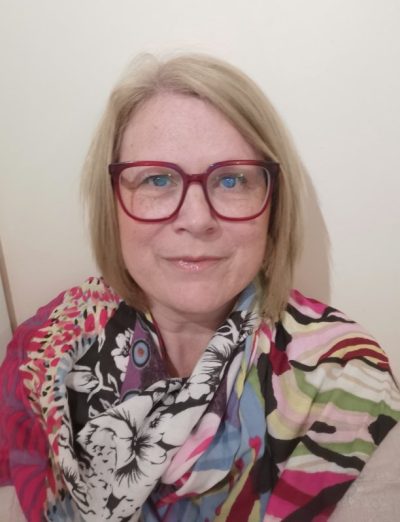
Carol Dyer lives in Gosport, Hampshire and is married with 5 boys. Her role as a Regional Roofbreaker Co-ordinator is to support and grow the work in the East and South-east of England. Carol has a real heart for both adults and children with disabilities and would love to see more churches making their places of worship a place where disabled people feel accepted and belong.
She has a special place in her heart for children with special educational needs and disabilities, having worked for a number of years in a school setting with SEND children.
If you would you like to know more about our Roofbreaker project and how you and your church can be involved then please get in contact with Carol Dyer carol@throughtheroof.org


